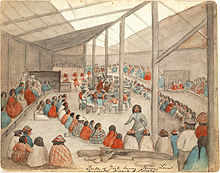Gift economy

A gift economy or gift culture is an economic model, where goods are not sold, but they are given away, without an explicit agreement for immediate or future rewards.[1][2] There are social norms and customs about the exact way the gift is given. In a gift culture, gifts are not given in an explicit exchange of goods or services for money, or some other commodity or service. In contrast, in a barter economy or a market economy goods and services are exhanged for a received value, usually money.

Anthropologists discussed the nature of gift economies. Research began with Bronisław Malinowski's description of the Kula ring[3] in the Trobriand Islands during World War I.[4] The Kula trade appeared to be gift-like because Trobrianders would travel great distances over dangerous seas to give what were considered valuable objects without any guarantee of a return. Malinkowski had a discussion with French anthropologist Marcel Mauss: This showed that gift economy was more complex that they first thought. They also introduced a number of technical terms to describe the different forms of exchange. Some of these terms are reciprocity, inalienable possessions, and presentation.[5][6]
Anthropologists Maurice Bloch and Jonathan Parry think that the unsettled relationship between market and non-market exchange will attract most attention. Some authors argue that gift economies build community, while markets harm community relationships.[7]
Some things that make gift exhange different from other forms of exhange. Usually, the idea of property, and property rights are different. Sometimes gifting forms a distinct "sphere of exchange" that is an "economic system". Giving a gift always establishes a social relationship. The nature of giving a gift in a market economy,is very different from "prestations" typical of non-market societies. Gift economies also differ from related phenomena, such as common property regimes and the exchange of non-commodified labour.
Potlatch
Potlatch is a celebration of native Americans of the Pacific Northwest. During the celebration, there is a ritual exchange of gifts. The value of the gifts demonstrates the wealth, power and influience of the person giving the gifts. Marcel Mauss saw this an example of a ruinous competition: The gifts often caused the ruin of the person giving them, or his tribe. That way, Potlatch was outlawed in Canada, in late 19th century. There was a push to re-introduce the tradition in the 1950s.
Related pages
- Anarchist economics
- Basic income
- Brownie points
- Calculation in kind
- Digital currency
- Egoboo
- Food swap
- Free education
- Giving circles
- History of money
- Homestay - CouchSurfing
- Knowledge market
- Natural economy
- Pay it forward
- Post-scarcity economy
- Primitive communism
- Solidarity economy
- World currency
Notes
- ↑ Cheal, David J (1988). "1". The Gift Economy. New York: Routledge. pp. 1–19. ISBN 0415006414. Retrieved 2009-06-18.
- ↑ Offer, A. (August 1997). "Between the Gift and the Market: The Economy of Regard" (PDF). The Economic History Review, New Series. 50 (3): 450–476. doi:10.1111/1468-0289.00064.
- ↑ Malinowski, Bronislaw (1922). Argonauts of the Western Pacific. London.
{cite book}: CS1 maint: location missing publisher (link) - ↑ Keesing, Roger; Strathern, Andrew (1988). Cultural Anthropology. A Contemporary Perspective. Fort Worth: Harcourt Brace and Company. p. 165.
- ↑ Mauss, Marcel (1970). The Gift: Forms and Functions of Exchange in Archaic Societies. London: Cohen & West.
- ↑ Weiner, Annette (1992). Inalienable Possessions: The Paradox of Keeping-while-Giving. Berkeley: University of California Press.
- ↑ J. Parry, M. Bloch (1989). "Introduction" in Money and the Morality of Exchange. Cambridge: Cambridge University Press. pp. 8–12.
Further reading
The concept of a gift economy has played a large role in works of fiction about alternative societies, especially in works of science fiction. Examples include:
- News from Nowhere (1890) by William Morris is a utopian novel about a society which operates on a gift economy.
- The Great Explosion (1962) by Eric Frank Russell describes the encounter of a military survey ship and a Gandhian pacifist society that operates as a gift economy.
- The Dispossessed (1974) by Ursula K. Le Guin is a novel about a gift economy society that had exiled themselves from their (capitalist) home planet.
- The Mars trilogy, a series of books written by Kim Stanley Robinson in the 1990s, suggests that new human societies that develop away from Earth could migrate toward a gift economy.
- The movie Pay It Forward (2000) centers on a schoolboy who, for a school project, comes up with the idea of doing a good deed for another and then asking the recipient to "pay it forward". Although the phrase "gift economy" is never explicitly mentioned, the scheme would, in effect, create one.
- Down and Out in the Magic Kingdom (2003) by Cory Doctorow describes future society where rejuvenation and body-enhancement have made death obsolete, and material goods are no longer scarce, resulting in a reputation-based (whuffie) economic system.
- Wizard's Holiday (2003) by Diane Duane describes two young wizards visiting a utopian-like planet whose economy is based on gift-giving and mutual support.
- Voyage from Yesteryear (1982) by James P. Hogan describes a society of the embryo colonists of Alpha Centauri who have a post-scarcity gift economy.
- Cradle of Saturn (1999) and its sequel The Anguished Dawn (2003) by James P. Hogan describe a colonization effort on Saturn's largest satellite. Both describe the challenges involved in adopting a new economic paradigm.
- Science fiction author Bruce Sterling wrote a story, Maneki-neko, in which the cat-paw gesture is the sign of a secret AI-based gift economy.
- The Gift Economy. Writings and videos of Genevieve Vaughan and associated scholars.